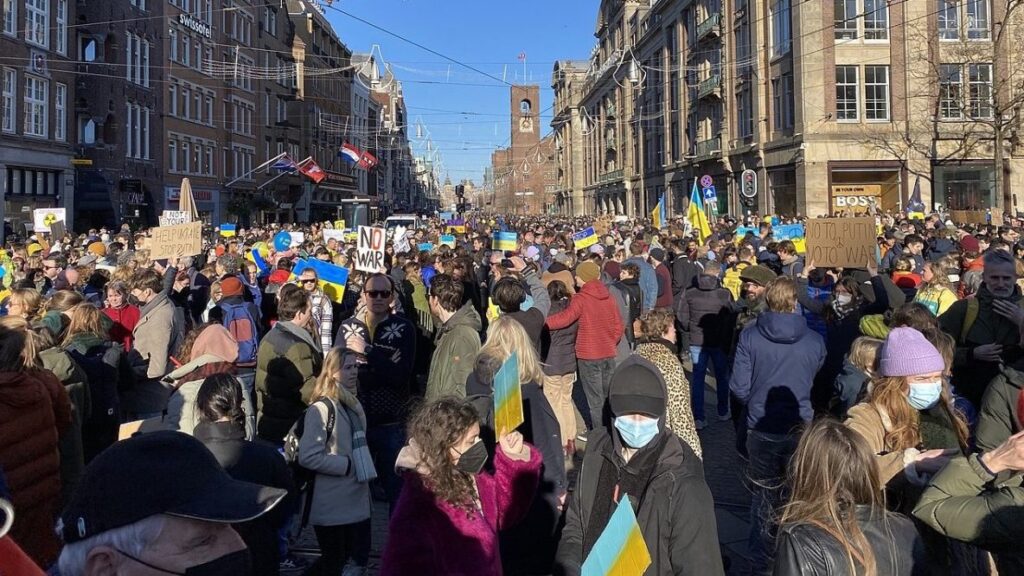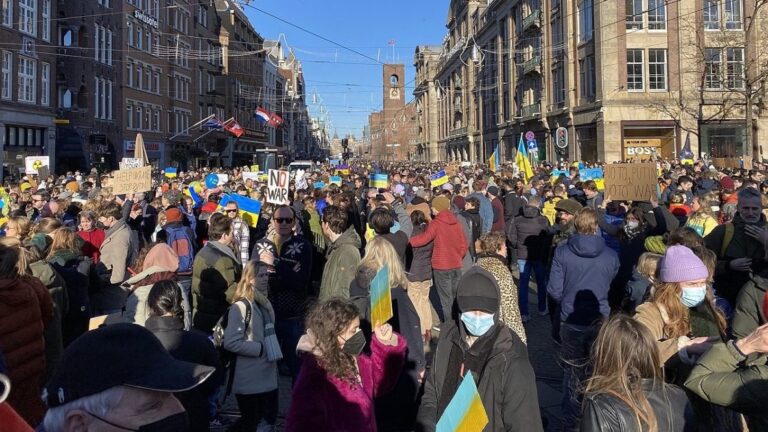Die Resignation gegenüber dem Krieg in der Ukraine ignoriert nicht nur die anhaltenden Gräueltaten, sondern auch deren Auswirkungen auf die zugrunde liegenden europäischen Narrative. Jetzt ist der Moment gekommen, politische Orthodoxien zu überdenken. Teil der Reihe “Lektionen des Krieges: Die Wiedergeburt Europas revisited”.
The Second International Writers Congress in Defence of Culture, held in 1937 in Valencia, the capital of the Spanish Republic after Franco’s attack on Madrid, became known as a spectacular cultural act of opposition to fascism. More than a hundred writers from all over the world attended the Congress. Their commitment to what they called revolutionary humanism, a struggle for human dignity and peoples’ freedom, is worth recalling at the historically similar moment in which we find ourselves today. Doing so might help us better understand the international predicament that Russia’s fascist invasion and a neo-colonial war of extermination against Ukraine actually represents.
The main political problem for the delegates in Valencia was the non-intervention policy of the western democracies, which they strongly condemned over and over again. In contrast, the cultural and political progressives of today have withdrawn into their ivory towers of non-escalation and non-intervention, or dwell in a poetical daydream of abstractly imagined pacifism, which is nothing but a euphemism for capitulation to fascism.
Europe is currently struggling with an all-encompassing challenge, one that has been Ukraine’s lived reality over the past year and a half: what is to be done about the ongoing devastation? This is, indeed, a multi-dimensional question – containing existential, military, political, psychological, social, ecological, economic and a whole range of other levels – and it doesn’t lend itself to any kind of cathartic answer. On the contrary, it contains only endless pain, in all respects.
The best expression of this persisting challenge might be Edvard Munch’s famous painting The Scream – we currently find ourselves in exactly such a moment of anxiety, uncertainty and distortion. The work originated in a panic attack suffered by Munch himself in 1892, and panic would actually be the appropriate reaction to Russia’s war crimes, instead of the pseudo-rational calculations we see today. The international community seems to be gradually accepting the atrocities as inevitable, a response that would previously have been absolutely unthinkable. Panic would perhaps also be a more effective political response, potentially triggering badly needed international action.
When it comes to the war in Europe, two discursive and visual approaches can be discerned in the public sphere, reflecting prevailing socio-political attitudes to the ongoing atrocities. The first is war porn, a sort of romanticisation of ruins, which like any porn is obscene. Here, the rubble simply serves as a typical media setting, keeping up the attention economy while those ruins are literally being constantly produced by the ongoing warfare. The second approach is the political fantasy of post-war reconstruction. Psychologically this is a very seductive strategy, because it allows for the omission of the harsh realities of the war itself, precisely because they are unbearably harsh, concentrating instead on what may come afterwards – all while the war rages on with no end in sight.
Europe faces a crisis, the outcomes of which will define the rest of the 21st century. Now is therefore exactly the right time for Europe to revisit and revise its own basic narratives, stories that Europeans have been telling for decades, deceiving both themselves and others. This historical moment has been famously dubbed a Zeitenwende (epochal shift), but a more precise term, picked up from Europe’s cultural history, would be what Aristotle called peripeteia, a peripety – a dramatic reversal of circumstances, a drastic change from one state of things to its opposite. Russia’s war against Ukraine and the West is indeed characterized by an Oedipal logic, and the task of Europe in these times of emergency is primarily to unlearn to unsee, in order to learn to see – to subject the narratives central to its history to profound revision and change, since they are decisive for Europe’s future.
The first is the discourse on genocide. This fundamental principle of post-Nazi Europe, whose political integration was based on the idea of a common responsibility for the Holocaust, was brutally challenged by Russia’s full-scale invasion of Ukraine. Apart from the filtration camps, mass deportations, kidnappings and omnipresent torture chambers, around 1600 cultural sites have been damaged or destroyed in Ukraine by the Russian military since 24 February 2022. Russia is deliberately targeting the country’s cultural infrastructure as part of its attacks on civilian facilities.
According to Rafal Lemkin, the author of the term ‘genocide’, destruction of cultural heritage is a method of achieving genocide. For him, genocide essentially consists of barbarity (attacking people) and vandalism (attacking culture). The second component, however, was omitted in the 1948 UN Genocide Convention. The reasons were clearly colonial – several of the western powers feared that their indigenous peoples (and former slaves) could apply the law against them. The UN instead adopted the 1954 Hague Convention protecting cultural heritage in armed conflict, a compromise that shifted the problem to a totally different orbit. The real question is not how to protect culture in a time of war (although this is obviously vital), but how to stop genocide. As soon as intentional large-scale destruction of culture starts, the conclusion should be that we are dealing with genocide.
But Europe still prefers to talk about genocide in terms of history politics, memory culture, and ‘coming to terms with the past’, often avoiding applying the term to the present for fear of its ‘relativization’. This is a typical instance of what in German is called Schuldabwehr, the deflection of the guilt. Trauma and fetishized guilt for past atrocities resurfaced when Europe was confronted with the Russian barbarity in Ukraine.
Europe’s problem is of course not the ‘relativization’ of genocide, but its own unwillingness to acknowledge that a genocide is going on in Ukraine – exactly because the genocide is taking place right now! That’s why Europe tends to argue that it’s not a ‘pure’ genocide, that genocide is hard to prove, etc. – despite the fact that Russia’s genocidal aims have been openly stated and publicly laid out by its state media and officials, including the Kremlin leader himself. For if Europe accepts the premise that it has in fact been witnessing a genocide in Ukraine for a long time, without doing everything possible and impossible to stop it, this would mean it has actually allowed genocide to take place and continue. On the very same territory as before. Again.
The second European narrative due for revision is that of decolonization. This has become yet another buzzword in international public debate, but the fundamental problem is that it is perceived and practiced in an apolitical, culturalized form. Decolonization is seen simply as a means of representation, whereas any proper anti-colonialism is first and foremost about serving justice. Without this, it remains hollow and fashionable rhetoric. Russia’s attack on Ukraine, which derives from a deeply rooted colonial mindset, only makes the case more urgent. Decolonization is not just about commemorating or representing various indigenous communal experiences (however important they may be), but about how to hold the perpetrators accountable for their colonial crimes.
The current ethnographization of decolonial issues, commonplace in numerous cultural projects across Europe, often re-enacts typical colonial stereotypes and cliches that comfortably fit the neo-imperial fantasy of both former and present colonial powers, pretending as they do that colonialism is already a closed case and that all we need to do now is to ‘celebrate diversity’. But decolonization is not a multikulti parade of different world cuisines. That would, indeed, be the worst outcome of the war for both the Ukrainian and the Crimean Tatar peoples – it would mean that the just cause of the colonized has been completely lost.
In this context, profound confusion is that decolonization has effectively been outsourced by the perpetrators to their victims: the so-called Global South or Europe’s post-Soviet East. If westerners or Russians were left to their own devices without any pressure from the other parts of the world, they wouldn’t be much bothered with decolonization at all! This is a profoundly perverted perspective, in which decolonization becomes a sort of therapy or psychological exercise for the colonized, reduced to personal stories and family roots, whereas it should actually be the opposite, namely a highly politicized and top-ranking issue on the colonizers’ agendas.
Colonialism must be tackled first and foremost by the imperial powers past and present, not by the colonized. The only colonial power that has ever been punished internationally for its atrocities was Nazi Germany. But even then, colonial crimes were hidden behind the misnomer Erinnerungskultur, as if it was indeed just a matter of remembrance culture, rather than the open wounds that still define the political and wartime reality of Europe.
A third European foundational narrative that requires political reinstatement is that of antifascism. Antifascism has been so central to modern European and global history that it has often been overlooked and turned into an attribute of a particular political group, a subculture performing its usual rituals on 1 May. Instead, antifascism should be treated as a cornerstone of today’s united Europe and the free world. Without the basis of anti-Nazism today’s political institutions and framework would never have emerged! Real democracy is only possible when it is antifascist by political nature, otherwise it’s not.
European societies have become so used to various rightwingers, populists, autocrats and authoritarianisms that Russia’s all-out assault on Ukraine caught them by surprise. Suddenly they were forced to face a fundamental question, which should be historically recognisable: how to deter and put an end to a fascist state regime (this time one with nuclear capabilities)? There has been a heated debate over whether it is proper to define the current Russian regime as fascist. Paradoxically, those who refuse to do so hide behind an over-historization of the phenomenon, not because of a lack of reasons, but because there are too many of them.
What is really striking is how deliberately and openly Russia’s authorities and military have been cosplaying the Nazis in their war against Ukraine. Promoting the Nazi rationale about ‘non-existent’ Ukrainians as a pretext for mass killings, using an ugly ‘denazification’ discourse to repurpose the historical case and absurdly justify the military invasion, stylizing an unprovoked war as a continuation of World War II (‘we can do it again’) – all Russia’s revanchist intentions have been actually aimed at subverting the European institutional and legal order, one based on the outcomes of the defeat of Nazism, in order to make the EU and NATO crack and regain control over Europe by dividing it again.
Russia’s war on Ukraine has made the need for a political antidote urgent: antifascism must be internationally reintroduced as the basis for state politics as well as for non-governmental policy-making. It is not a feature of a particular part of the political spectrum, but constitutes the very condition for the political spectrum to at all exist. Here Europe carries a particular historical and political responsibility, and through that may achieve what Aristotle called anagnorisis – a change from ignorance to knowledge, a recognition not only of a person but also of what that person stands for.
Today, one can only cautiously hope that such recognition of Europe and what it stands for may pave the way from the current tragedy of war to an all-European political catharsis. But hope is what is left at the very bottom of Pandora’s box.








